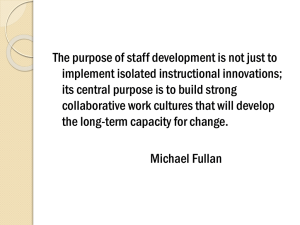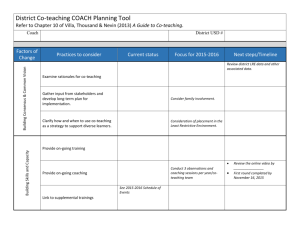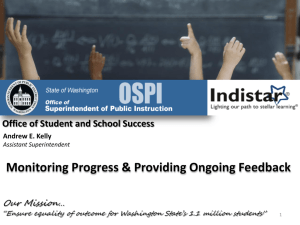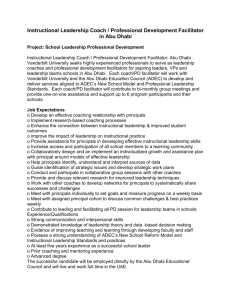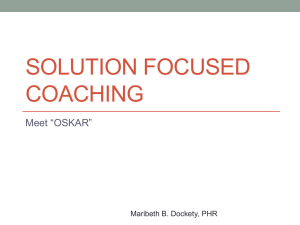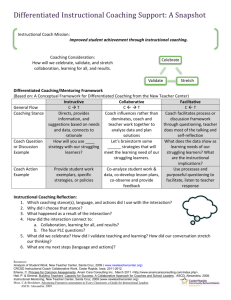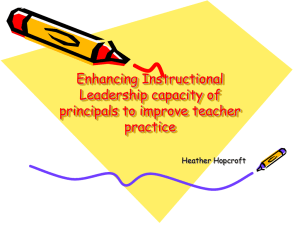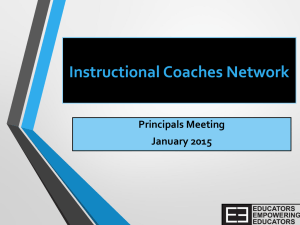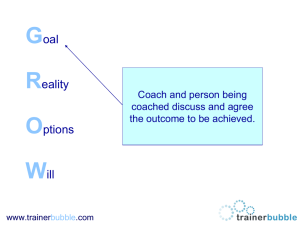Raising Student Achievement Through Distributive Leadership: A
advertisement
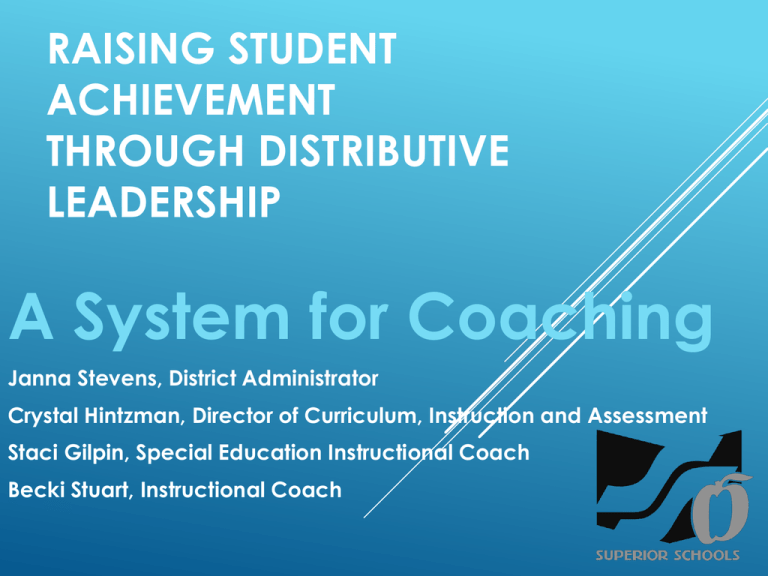
RAISING STUDENT ACHIEVEMENT THROUGH DISTRIBUTIVE LEADERSHIP A System for Coaching Janna Stevens, District Administrator Crystal Hintzman, Director of Curriculum, Instruction and Assessment Staci Gilpin, Special Education Instructional Coach Becki Stuart, Instructional Coach Rational for coaching Results on student achievement Attributes of an effective model Determine implications for your district OUTCOMES Our Story My Learning State Mandates Vision SUPERIOR’S PATH Our student data * math * reading EFFECTS OF COACHING MAP: MATH FALL 2012 – FALL 2013 ELEMENTARY 100 Percentage of Students 90 80 70 60 50 40 30 20 10 0 % Above % Below [Fall 12-13] MAP-Math-04 50.48 49.52 [Fall 13-14] MAP-Math-05 60.49 39.51 MAP MATH FALL 2012 – FALL 2013 SECONDARY 100 Percentage of Students 90 80 70 60 50 40 30 20 10 0 % Above % Below [Fall 12-13] MAP-Math08 49.19 50.81 [Fall 13-14] MAP-Math09 32.54 67.46 MAP READING FALL 2012 – FALL 2013 Percentage of Students ELEMENTARY 100 90 80 70 60 50 40 30 20 10 0 % Above % Below [Fall 12-13] MAPReading-04 47.92 52.08 [Fall 13-14] MAPReading-05 45.54 54.46 MAP READING FALL 2012 – FALL 2013 SECONDARY 100 Percentage of Students 90 80 70 60 50 40 30 20 10 0 % Above % Below [Fall 12-13] MAP-Reading08 54.4 45.6 [Fall 13-14] MAP-Reading09 61.74 38.26 Professional development for coaches/principals on effective instruction Principal/coach collaboration Qualities of an effective coach Sustained frequency of professional development Administrative and School Board support ATTRIBUTES FOR SUCCESS Show Be the method with the method one step ahead One size doesn’t fit all Shared vision and outcomes PROFESSIONAL DEVELOPMENT FOR COACHES/ PRINCIPALS What supports do coaches need in order to succeed? Appropriate Principals Shared professional development who are instructional leaders vision Principals who take a hands-on approach PRINCIPAL/COACH COLLABORATION Beliefs Believes everyone can learn Commitment to continuous improvement Teaching Expertise Data driven instructional planning Ability to apply research-based best practices Coaching Skills Listening Questioning Encourages reflective practice Killion, J. & Harrison, C. (2006). Taking the Lead, National Staff Development Council, Oxford, OH. Wisconsin RtI Center QUALITIES OF AN EFFECTIVE COACH Relationship Skills Collaborative Curious Builds Trust/Creates Partnerships Leadership Skills Shared Leadership Self Management Builds commitment and capacity Deep understanding of systems change Killion, J. & Harrison, C. (2006). Taking the Lead, National Staff Development Council, Oxford, OH. Wisconsin RtI Center QUALITIES OF AN EFFECTIVE COACH How often do you discuss professional practice? How do you create a platform for discussion, growth, and continuous improvement? Focus: Improve teacher ability to use formative assessment, CCSS curriculum implementation and high-impact instructional strategies. SUSTAINED FREQUENCY OF PROFESSIONAL DEVELOPMENT What is the model for professional development? Science School Department: Superior High Theory, Demonstration, Practice, Feedback, In-Situation Coaching SUSTAINED FREQUENCY OF PROFESSIONAL DEVELOPMENT Understanding Actually Learn Knowledge and Skills Skills Use Skills with Fidelity Presentation of Theory 85% 15% 5-10% Modeling 85% 18% 5-10% 85% 80% 10-15% 90% 90% 80-90% Practice and Low Risk Feedback Coaching Feedback with Peer Visits Impact of coaching on teacher’s practice Continued Asking telling reflection questions, avoiding advising or Coach acts as a mirror to classroom practices SUSTAINED FREQUENCY OF PROFESSIONAL DEVELOPMENT An understanding Financial Time ADMINISTRATIVE AND SCHOOL BOARD SUPPORT What is your student data? What level and type of professional development do you have? What resources do you provide? How are you supporting staff with state and federal mandates? IMPLICATIONS TO CONSIDER

